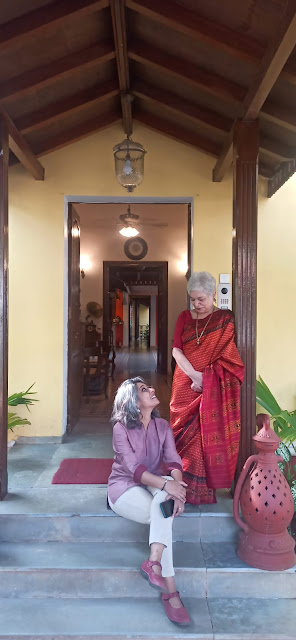It must have been my lucky week. Laila Tyabji, who is somehow puckish, formidable, and beautiful all at the same time, was my housemate at the Goa Heritage Festival.
I went to the festival with my mother, she with her daughter Urvashi. Our foursome began each morning with plans for the day and ended with a gossipy, raucous dinnertime postmortem.
In between we went to the many fascinating talks and discussions. I came away with wisdom and gentleness from Damodar Mauzo, Gnanpith-awarded Konkani writer, who was the third occupant of the Surya Kiran Heritage Hotel bungalow, which was the venue of the events as well as our warm and pleasant temporary home. Laila gave an illustrated talk on saris and that evening there was a playful sari catwalk, showcasing Kunbi saris, at the enormous, carnivalesque mela spread across the park opposite the hotel, where there was food, drink, music, local produce every day. I was in conversation with Vivek Menezes, who was curating and conducting our bit of the festival, a chapter in the "Suitable Conversations" series run by A Suitable Agency. All the talks were at the Heritage Bistro, informal and intimate. The big closing talk, "My Awakening", was by Siddhesh Gautam, Dalit activist and artist.
The loveliest thing about this festival was how rooted it was in its neighbourhood, Campal, on the Mandovi riverfront. You didn't feel as if you had been airdropped into a festival hothouse and flown out again at the end. My day started with walks -- along the river to the beach, or more often in the neighbourhood, where I loved the morning rhythm: the bread seller would cycle down tooting his bhopu and then pausing to sell his poi. The fish seller would go past next, announced ahead by the smell. The dogs would scamper out for their walks. One dog called Jake Pinto invited me with such enthusiasm, his owners had no choice but to ask me in and show me around their astonishing home, where at the door you are greeted by a colonial era bust of Gandhiji smiling genially at our nonsense.
I would also encounter daily a stocky black and brown dog in a hurry, too preoccupied to pause and chat with me. I discovered why: he spends his nights with his friend, a 91-year old ex-violin teacher, Antonio, and then goes for the day to his other friend Derek down the road for food and fun with Derek's three dogs, returning for the night to lie vigilantly below his master's bed. One of the festival events was an adoption camp run by the neighbourhood's Dr Charmayne's Pet Clinic, in which 14 pups found homes.
At the carnival there was young Imli, who wagged her tail nonstop at the ZeroPosro van encouraging people to buy the organic, no-waste produce they sold. Down the road, beyond the van were the brilliant young people of the Amche Mollem movement who are trying to through art to pause a juggernaut: 3 mega infrastructure projects that will cut through and destroy the Bhagwan Mahavir Wildlife Sanctuary & Mollem National Park, Goa. I saw how they managed to involve every passer by, inviting them to sit down at a table, colour a part of a picture, listen to them talk about their fight. As I coloured my bit of Goa's wildlife, I sent up a fervent prayer for the survival of the animals, the mangroves, the forests they were trying to shelter, and also for the survival of all that the Goa Heritage Festival was trying to protect. (The photograph is by Vivek Menezes)

